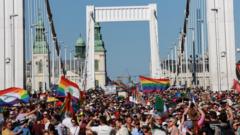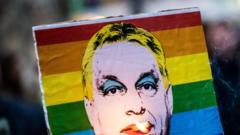In a bold act of defiance against legislation targeting LGBTQ rights, Budapest Mayor Gergely Karacsony, questioned by police as a suspect, helped facilitate a banned Pride march that attracted over 200,000 attendees. Despite explicit legal warnings from Prime Minister Viktor Orban's administration, Karacsony has claimed his actions uphold the values of freedom and love. He may face up to a year in jail if convicted under the government's restrictive laws.
Budapest Mayor Faces Police Inquiry Over Defiant Pride March

Budapest Mayor Faces Police Inquiry Over Defiant Pride March
Budapest's mayor is under investigation for organizing a controversial LGBTQ Pride event that was banned by the government, drawing significant public support.
In his statement to the media outside the National Bureau of Investigation, Karacsony criticized the accusations against him as unfounded and expressed intentions to lodge a complaint. His determination to support the LGBTQ community comes amid ongoing state measures that have increasingly marginalized sexual minorities in Hungary, including prohibitions on discussions involving homosexuality in contexts accessible to minors.
The annual Pride march, seen as a direct challenge to Orban's government, proceeded in June, allowing participants to express solidarity for LGBTQ rights despite legal threats. While previous government responses have included extensive fines for attendees, police later announced they would not penalize individuals who participated in this year's rally. Amidst heightened scrutiny and police investigation, the mayor’s commitment to uphold the march symbolizes a broader struggle for civil liberties in Hungary’s shifting political landscape.
As the investigation continues, the implications for Karacsony and the LGBTQ movement in Hungary loom large, with many viewing this event as a pivotal moment in the tension between civil rights and governmental authority.
Karacsony’s actions have rallied support, reinforcing a message that defiance to unjust laws is crucial in the fight for equality in Budapest and beyond.
The situation remains fluid as further developments unfold in this contentious political environment.
The annual Pride march, seen as a direct challenge to Orban's government, proceeded in June, allowing participants to express solidarity for LGBTQ rights despite legal threats. While previous government responses have included extensive fines for attendees, police later announced they would not penalize individuals who participated in this year's rally. Amidst heightened scrutiny and police investigation, the mayor’s commitment to uphold the march symbolizes a broader struggle for civil liberties in Hungary’s shifting political landscape.
As the investigation continues, the implications for Karacsony and the LGBTQ movement in Hungary loom large, with many viewing this event as a pivotal moment in the tension between civil rights and governmental authority.
Karacsony’s actions have rallied support, reinforcing a message that defiance to unjust laws is crucial in the fight for equality in Budapest and beyond.
The situation remains fluid as further developments unfold in this contentious political environment.





















